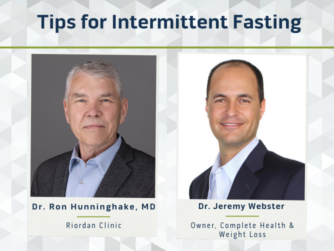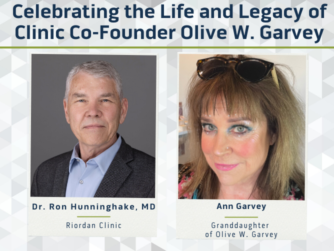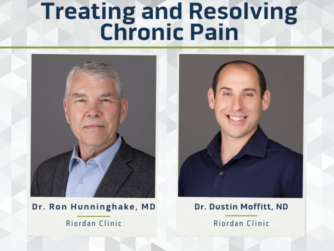With Michael (Mike) Shaw, PA-C, ABAAHP
In this episode of the Real Health Podcast, Riordan Clinic’s Chief Medical Officer Dr. Ron Hunninghake, MD, is joined by Michael (Mike) Shaw, PA-C, ABAAHP, to discuss the link between metabolic syndrome and heart disease, and how the five indicators of metabolic disorders are directly related to a number of chronic illnesses. Many American adults have at least one risk factor for a metabolic disorder.
Watch the Video
Thank You to this Episode’s Sponsor
Bio-Center Laboratory
Links
Riordan Clinic: https://riordanclinic.org/
Episode Transcript
Disclaimer: The information contained on the Real Health Podcast and the resources mentioned are for educational purposes only. They are not intended as and shall not be understood or construed as medical or health advice. The information contained on this podcast is not a substitute for medical or health advice from a professional who is aware of the facts and circumstances of your individual situation. Information provided by hosts and guests on the Real Health Podcast or the use of any products or services mentioned does not create a practitioner patient relationship between you and any person’s affiliated with this podcast. This is the Real Health Podcast, brought to you by Riordan Clinic. Our mission is to bring you the latest information and top experts in functional and integrative medicine, to help you make informed decisions on your path to real health.
Dr. Ron Hunninghake: Well, welcome everyone. We’re back at the Real Health Podcast once again. And I’m Dr. Ron Hunninghake. I’m the Chief Medical Officer here at the Riordan +++Clinic, and today, I have the privilege of introducing once again Mr. Michael Shaw. Mike is my trusted sidekick over in Dome 5, where we are looking at the whole person. But today, we’re going to kind of zero in at a syndrome called the metabolic syndrome. And the reason I wanted Mike to be in on this is that he’s had over 30 years of experience working in the cardiovascular field. And that’s a big component of metabolic syndrome. It goes deeper than that, but I thought this is where we should start today. So Mike, tell us a little bit of, how does the metabolic syndrome, what is it, and how does it relate to heart disease and the risk of heart disease?
Michael Shaw: Well, actually metabolic syndrome is kind of made up of five different risk factors that, in cardiology, we would always evaluate in somebody coming in with a family history or personal risk history for cardiovascular disease. And starting out, usually a big culprit is too much belly fat around the waist. It’s hormonally active and disruptive and usually lead to things like elevated levels of triglycerides. We focus a lot in cardiology on cholesterol profiles. But my interest was always pretty much focused on triglycerides, because I think they’re very atherogenic, meaning sticky. They can help develop plaque. They’re inflammatory prone. So another aspect that’s always been talked about is the good cholesterol, HDL. And it’s one of those five factors.
Having a low HDL is counterproductive to not being at greater risk for cardiovascular problems. Blood pressure, of course, has been around for a long time as being a risk factor, because of the way it influences the vascular wall. And high blood pressures don’t lend themselves well to heart function or vessel function in the brain. And then, elevated sugar. Of course, everybody knows about diabetes and it’s a pretty huge risk factor. Because sugars not poorly controlled drive more insulin to be secreted, which creates more inflammatory drive, that then disrupts the integrity of the vascular wall and makes it more susceptible to things that go through our bloodstream 24/7 automatically starts sticking to the wall.
Dr. Ron Hunninghake: And what’s really interesting about insulin, insulin seems to be the evil villain in this metabolic syndrome. And one of the things I’m having patients do, in addition to looking at the five risk factors that you just mentioned, is to start having your doctor measure your fasting insulin level. Because if you’re running a fasting insulin level, you may or may not have these other five risk factors, but a fasting insulin level is telling you right then and there, that you have metabolic syndrome and that you are at risk for cardiovascular disease. And as it turns out, you’re also at risk for cancer.
Of course, you mentioned diabetes, autoimmune diseases, mood disorders, such as depression, anxiety, those kinds of things can also be a factor here. And so, a number of chronic illnesses are directly related to this metabolic syndrome. So you’re not just putting your heart at risk, you’re putting your whole sense of wellbeing. Alzheimer’s is another one that I forgot to mention. And so, these are things that we all need to be aware of when we’re going to our doctor to have us evaluated. But Mike, in your experience, how much does this affect the general public? What’s some of the percentages in the incidents?
Michael Shaw: Well, one of the issues is that upwards of 60% of the population is overweight. So that, as a starting point. And most people that are overweight, most of the time, it’s collected around the abdominal, upper abdominal area, that makes it more hormonally disruptive. So that’s a big factor, the weight issue. And the other is a tendency towards a large part of the population to be fairly sedentary. If you can’t burn up the calories that you’re consuming and taking in, well, insulin drives the sugar into fat cells to be stored for future use.
Dr. Ron Hunninghake: And so, the other part of this is it’s not just belly fat, it’s what they’re calling visceral fat.
Michael Shaw: Visceral fat, yes.
Dr. Ron Hunninghake: So the inside of the abdomen there, there’s a fat pad in there and it will build up. And also, liver fat. And it turns out that metabolic syndrome is very closely connected to fatty liver syndrome. And this is something that’s rapidly growing, literally, in the United States and around the world, partly because we consume, not only just regular sugar, but the fructose corn syrup sugar tends to accelerate this. And so, when you have fatty liver syndrome, you are at risk of, not only continuing to get worse and worse cardiovascular diseases and all the other diseases we mentioned that are associated with visceral fat, but you also could end up needing a new liver, a liver transplant.
Because this can cause your liver to fail. So it seems pretty benign. “Hey, I’m just going to be eating a little bit of extra sugar, doc. What’s the big problem with that?” Well, a little bit turns out to be more. And more turns out to be a lot. And over time, we have all these severe consequences that begin to show up. And it takes a lot of change, in terms of your daily lifestyle habits, to turn this around.
Michael Shaw: Absolutely. And lifestyle change isn’t easy. And most of the studies say that if you have three or more of these risk factors, that kind of automatically puts you in the metabolic syndrome class.
Dr. Ron Hunninghake: I think if we go through these just one more time, waist greater than 35 inches or more for women and 40 inches or more for men, that’s very common these days. It’s 60% of the population. High triglycerides, you’re going to have to get that measured. But most everyone, when they go in for their annual, they do check a lipid profile.
Michael Shaw: And triglycerides are always included in a cholesterol profile. So it’s readily available to be evaluated.
Dr. Ron Hunninghake: A little sideline on that, what’s happened in the last 30 years is that we have demonized what were the common fats, the saturated fats, and I’m not promoting saturated fats per se. But what’s happened is that most of your packaged foods and your restaurant foods are now using a so-called plant-based fat, but unfortunately, it’s a polyunsaturated fat that where these double bonds are very unstable and they end up becoming rancid or hydrogenated, especially when you’re cooking French fries and high heat foods. You’re changing the constitution of these fats and they are disrupting your mitochondria, which is the part of the cells that generates energy.
And I’m going to say, to make this real simple for people, the most common symptom that I hear about and that I’ve read that is the most common symptoms that doctors are approached with is fatigue. And so, if you’ve got metabolic syndrome, you’re almost always going to have fatigue, trouble sleeping, you never can seem to get enough rest, and you’re drowsy. All these things are a little … They’re not something that you can measure, like your waist size, but subjectively, you know that, for some reason, you just don’t have the energy that you used to have.
Michael Shaw: Yeah, that’s right. And I think things with, when you have your glucose and insulin mechanism interrupted and you don’t get the flow of energy into cells appropriately, the brain has to have a continuous flow of energy, in order to be able to think, your muscles to perform. It’s all kind of tied together.
Advertisement: There’s a lot more to this conversation, and it’s coming up right after a quick break. Today’s podcast is brought to you by LivOn Labs, makers of liposomal vitamins and supplements. LivOn uses a liposomal encapsulation technology to protect nutrients from destruction in the digestive system. This allows for more efficient delivery of essential vitamins and nutrients. Choose from various supplements that support health and wellbeing, such as Lypo-Spheric Vitamin C, magnesium, glutathione and more. To learn more, visit LivOn Labs, that’s L I V O N labs.com.
Dr. Ron Hunninghake: The scary stuff for me, we are dealing here at the Riordan Clinic more and more with cancer patients, and it’s becoming pretty clear that high insulin levels are a driver for cancer cell growth. It’s a growth factor. And so, when you have high insulin, you’re not only going to grow around your waist, but if there are tumors there in your body, that can drive the growth of those tumors. So memory, too, plays into this. And of course, the number one thing people think about in terms of blood sugar is diabetes. And certainly, you’re going to be more prone for type two diabetes, but how many people realize that the metabolic syndrome is associated with type three diabetes?
This is where your brain can no longer absorb sugar as well as it could. And so, then your memory and your thinking starts to go downhill. And this is due to insulin resistance of the brain. And so, people have gotten interested in the ketogenic diet, for this particular reason. What are some of the other things that a person can do, Mike, that would help them deal with their metabolic syndrome if they begin to realize, “Hey, I’m heading down the wrong path here. What do I need to change in my lifestyle that’ll make this better?”
Michael Shaw: Well, one, when you look at the approach to foods, trying to use less refined products and move away from sugar based products and adding more fiber, whether it’s in fresh fruits and vegetables or whole grains, but more fiber. And you already mentioned making good choices on selecting the fats you’re going to consume versus the unhealthy fats. And of course, monounsaturated oils are much more appropriate than … I like those the best. Probably second would be polyunsaturated, but you sure want to avoid some of the other heavier oils because they’re pretty well atherogenic, means they can stick to the vascular wall. Trans fats, of course, are another issue. Avoid anything that is even close to a trans fat, or if it’s on the back of an ingredient label, that it’s been deep fried or cooked. Because a lot of times, those kinds of oils are like trans fats. Alcohol content. Stay active.
Dr. Ron Hunninghake: The exercise piece is turning out to be really important. And I think people are getting that. And I see more and more people getting out and walking and running or they have a gym membership, but they have to be active at least two to three times per week, in order to get the full benefit of exercise. And exercise alone, unfortunately, will not always do a very good job of bringing the weight down. So the approach to this metabolic syndrome is a multifaceted approach.
Michael Shaw: Absolutely. You could walk a really long ways. And then, if you don’t alter the course of your dietary preferences, you’re going to have an uphill battle, being able to outdistance. I’ve always told my patients, “It’s pretty hard to outdistance what your mouth can do in a fraction of the time.” No matter how physically active you are. You have to be considerate of the choices you make, that you’re going to consume, because some of them are really hard to burn up.
Dr. Ron Hunninghake: And the way I kind of look at this is for people to, first of all, realize that no one’s going to do this for them. It’s an active choice that they need to make in the context of their own life. They need to make room for better food choices. Sometimes that means clearing out the kitchen of all the bad stuff. If it’s there, you’re probably going to eat it. Your best way to control your choices is what you buy at the grocery store. And if you give in there, you can pretty much bet you’re going to go ahead and eat those types of things.
Michael Shaw: Yes.
Dr. Ron Hunninghake: Now you work a lot with people on weight loss, so I’m just starting to talk a little bit about, what are some of the ideas that you think are really appropriate for people who are beginning to realize their waist is getting, the pants are fitting tighter, they’re getting tireder, maybe they’ve had a high triglyceride level, their blood pressure’s going up? What sort of other lifestyle interventions do you think are beneficial?
Michael Shaw: Well, a lot of times, if somebody comes in and they have an extra 25 or 30 pounds that they’ve gained and they want to try to lose weight, I will work with them on some kind of a focused dietary approach, to where we reduce their daily calorie intake and try to increase their daily calorie output, by being more active. And usually, we’ll give them dietary protocol with recommendations and suggestions on sample type meals that would be better suited for accomplishing the task, rather than just randomly stumbling through it. I try to focus on foods that don’t have a lot of cholesterol and a lot of triglycerides in them and more bulk type foods, like the vegetables and fruits and with higher fiber content.
Dr. Ron Hunninghake: Intermittent fasting has caught on here in recent times. And that, a lot of people say, “Well, I can’t do that. I just can’t do that, because if I don’t eat, I’m going to get a headache or I’m going to get really tired.” Well, that’s a pretty good sign right there that you got the metabolic syndrome. But intermittent fasting could be as simple as eating a breakfast a half an hour to an hour later than what you normally do or cutting off your after supper eating. Because not only does that interfere with some of your good quality sleep, it disallows you from having a period of time where your body is able to use up its carbohydrate stores and to start burning fat.
Michael Shaw: Yes, I try to encourage patients to think, if they’re struggling with being able to do intermittent fasting during the day, is widening out their period of not eating. Then also incorporates the nighttime when they’re asleep. And just don’t eat quite as early in the morning, maybe wait till 10 o’clock and try not to eat much after 6 or 7 in the evening. So then, you have this expanded time of no eating, and a lot of it’s being consumed by sleep. So it’s not as …
Dr. Ron Hunninghake: Of course, that’s why they called the first meal of the day break fast. It’s supposed to be a time of fasting. People who do eat during the night, very often the reason they are is because they’re having hypoglycemic reactions. And then, they feel like they have to eat. Or if they don’t get up and eat, that those hypoglycemic reactions will disrupt their sleep. And so, poor quality sleep can be part of the deterioration that goes on with metabolic syndrome. Anyway, we could go on and on. I think this is a good introduction to our audience to help them become more aware of the prevalence of metabolic syndrome. There are some estimates that it may be as high as 80%, 85%. It’s just not everyone who has metabolic syndrome is overweight. You can have it and be normal weight. So I think it’s up to our listening audience to, once again, take responsibility for your health and wellbeing. And if you can identify it at an early stage and make effective interventions, it will pay off in the long run with a reduced incidence of all kinds of medical problems.
Michael Shaw: Well, and I think also, most patients have available to them, when they go to their doctor, the cholesterol profile. And in that cholesterol profile, if you look at where your triglycerides are at and where your HDL is at, because a low HDL and high triglycerides are two of the risk factors for metabolic syndrome. And then, also looking at where your blood pressure is. If you are consistently at a 130 over 85 or higher, well, and where your blood sugar is at, everybody goes to the doctor once a year, has a metabolic panel, there’s glucose in there. If you have a glucose above 100, but below 126, we call that pre-diabetic and that’s too much glucose. And then, the response is insulin’s being poured in to try to get it under control.
Dr. Ron Hunninghake: So these are objective and you only have to have three of these objective standards. And then, subjective, if you’re tired, if you’re just not feeling well, and you have any of these or a significant number of these, think in terms of having metabolic syndrome, own up to it. Because if you start now, you can avoid a lot of long-term health issues. So Mike, thank you very much for being on our program again.
Michael Shaw: Well thank you for the opportunity.
Dr. Ron Hunninghake: Yeah, and I hope everyone in the audience, this is kind of giving you some motivation, information, and motivation, to take charge of your own health and make changes now, while it’s easier. Because it only gets harder, if you can’t see in the mirror changes that are putting you at risk for a whole number of chronic illnesses. So thanks for listening in. This is Dr. Ron Huntinghake.
Outro: Thank you for listening to the Real Health Podcast. If you enjoyed this episode, be sure to subscribe and leave us a review. You can also find all of the episodes and show notes over at realhealthpodcast.org. Also be sure to visit riordanclinic.org, where you will find hundreds of videos and articles to help you create your own version of real health.





